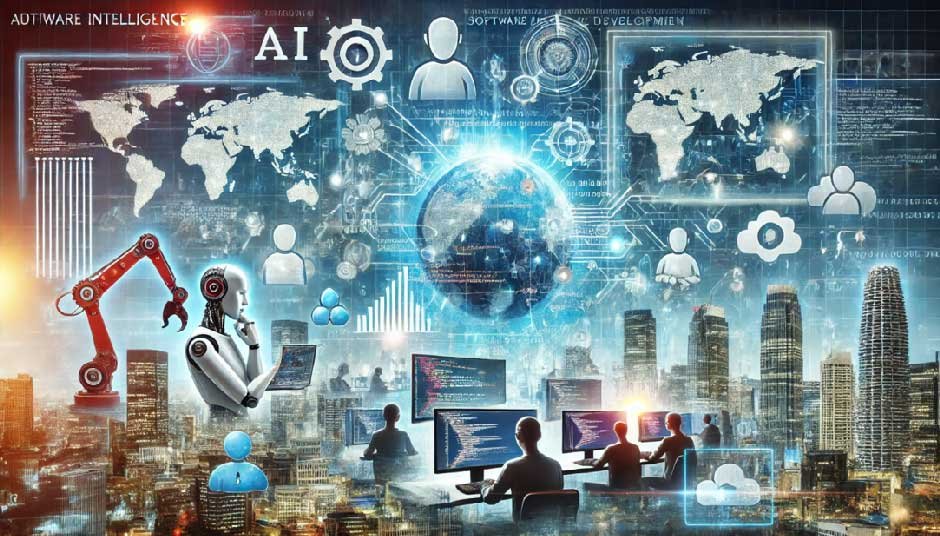Skip to the good bit
ToggleOutsourcing has been a cost-effective, skill oriented and efficient strategic approach for many companies. The exchange of human collaboration allows to access skilled people globally. However, the rise of AI has both streamlined the workflow but hindered the need of human workforce. The landscape is transforming from labor -intensive tasks to more AI-driven, technology-backed solutions. So, we often face the question: What does this mean for businesses, workers, and the outsourcing industry as a whole?
Role of AI in Outsourcing
Outsourcing is a business practice of delegating tasks, operation, or service to outsourcing companies rather than handling themselves. This traditional method often comes under scrutiny because of miscommunication, uneven quality deliverance and delay in cooperations. However, AI and automation has transformed the outsourcing business.
There are many customers service, data entry, and Software Development Outsourcing companies that access support to offshore teams. These tasks were labor-intensive, often requiring large teams. But with AI-powered chatbots, robotic process automation (RPA), and machine learning (ML) algorithms, these tasks are easily handled with less workforce.
How AI is Transforming Outsourcing Landscape

The Shift from Low-Skill to High-Skill Work
Automation has allowed businesses to stop recruiting for low-skill or repetitive tasks. This increased the demand for high-skill jobs, but they still need experts to maintain and improve the AI system. As a result, instead of outsourcing low-skill experts, high-skill, value-driven professionals are getting outsourced.
For example, instead of hiring data entry operators, companies are now outsourcing work to AI specialists, data scientists, and software engineers who can develop and maintain AI systems.
Data-Driven Decisions
AI and automation have reduced many redundant tasks allowing companies to take more direct decisions. This has led to many outsourcing firms integrating AI into their operations to enhance efficiency and improve service delivery.
For example, AI-driven chatbots and virtual assistants have improved customer support in outsourced call centers, reducing response times and increasing customer satisfaction. Automation has streamlined processes like payroll management, data entry, and cybersecurity monitoring. Apart from that predictive AI has allowed companies to stay ahead of the curve by forecasting market trends.
Evolution in Outsourcing Hubs
Countries such as India and the Philippines, major outsourcing hubs are transforming or upskilling their workforce to meet the market demands. Instead of call center or IT support, they have expertise in AI development, data analysis and cybersecurity.
Governments and private organizations are investing in training programs to equip professionals with AI-related skills. This shift is crucial for maintaining their relevance in the global outsourcing industry. AI and automation are the next wave in many business sectors and companies are gearing up to integrate these technologies to enhance efficiency, reduce costs, and stay competitive.
The Human Touch in an AI-Driven World

Despite AI’s rapid advancements, there are still many areas where human expertise is irreplaceable. Creative industries, complex problem-solving, emotional intelligence, and relationship-based roles still require human involvement. AI can process data and automate workflows, but it cannot replace human intuition, critical thinking, and emotional connections.
For example, while AI can generate reports and analyze business trends, human consultants are still needed to interpret data and provide strategic recommendations. In customer service, AI chatbots may handle basic queries, but human agents are essential for complex issues that require empathy and personalized solutions.
Challenges and Ethical Concerns
As AI and automation reshape outsourcing, ethical concerns and challenges also arise. One major concern is job displacement. Many workers in traditional outsourcing roles may find themselves replaced by AI-driven solutions, leading to unemployment and economic shifts in countries dependent on outsourcing industries.
Another challenge is data security. AI-powered outsourcing involves handling large amounts of sensitive business data, making cybersecurity a top priority. Companies need to ensure their outsourcing partners follow strict data protection measures to prevent cyber threats and breaches.
Many businesses have to incorporate AI in their workforce to stay ahead but the initial cost will be much higher. It requires upfront investment in infrastructure, tools and training of individuals. The efficiency of AI depends on the data or information they are fed, so one should hire expertise to handle the quality issues.
The Future: A Hybrid Model of AI and Human Collaboration
The future of outsourcing is not about AI replacing humans but rather about AI and humans working together. Businesses are likely to adopt a hybrid model where AI handles repetitive tasks while humans focus on strategic, creative, and relationship-based roles.
For example, in digital marketing outsourcing, AI tools can analyze customer behavior, automate ad placements, and optimize campaigns. However, human marketers are still needed to develop creative campaigns, craft compelling content, and build relationships with customers.
Similarly, in healthcare outsourcing, AI can process medical records, detect anomalies in scans, and automate billing processes. Yet, doctors, nurses, and medical consultants remain essential for patient care, diagnosis, and decision-making.
Preparing for the Future

To thrive in this AI-driven outsourcing era, businesses, workers, and outsourcing providers must adapt. Here’s how:
- Upskilling and Reskilling – Workers need to acquire AI-related skills to stay relevant. Continuous learning in areas like AI programming, data analytics, and cybersecurity can open new opportunities.
- Adopting AI in Business Operations – Companies should embrace AI-powered outsourcing solutions to enhance efficiency while ensuring a balance between automation and human expertise.
- Focusing on High-Value Services – Outsourcing providers must shift from offering low-cost labor to high-value, AI-driven solutions that cater to business needs in an automated world.
- Addressing Ethical Concerns – Businesses must ensure responsible AI development and implementation, focusing on job transitions, ethical AI training, and data security.
Conclusion
AI and automation are transforming outsourcing, making it more efficient and technology driven. While traditional roles are disappearing, new opportunities are emerging in AI development, data analysis, and cybersecurity. The outsourcing industry is shifting from a cost-cutting strategy to a value-driven approach where expertise and innovation take center stage.
Rather than fearing AI, businesses and workers should see it as a tool to enhance efficiency and open new possibilities. By adapting to this new landscape, the outsourcing industry can continue to thrive in the era of AI and automation.







